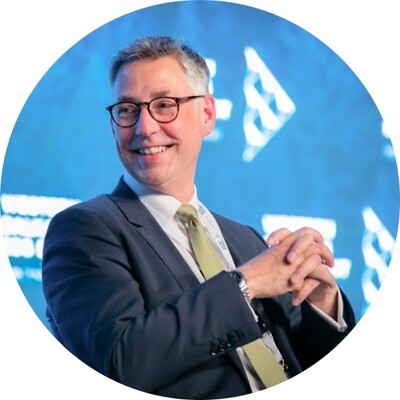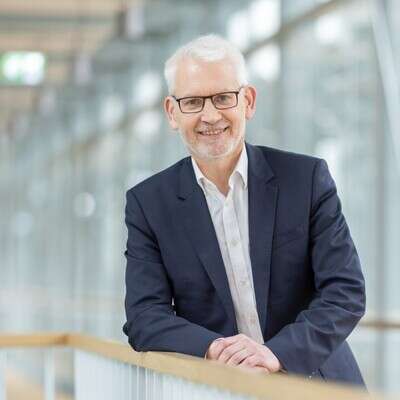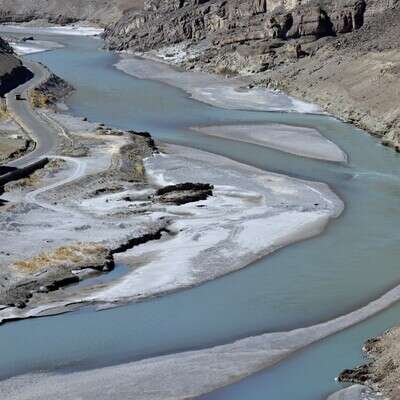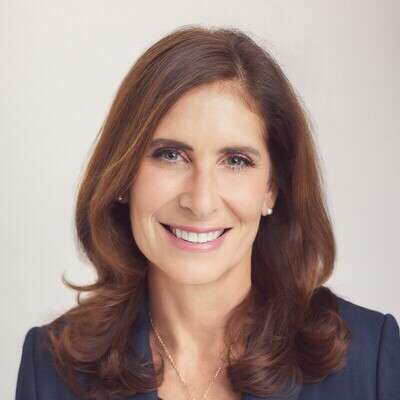Boyden Executive Survey
Executive View with Rikard Scoufias, Non-Executive Chair, HEREMA S.A.
“Adaptive leaders use lateral thinking and an ability to engage in stakeholder psychology to find their way through complexity”

Today’s complex landscape demands adaptive, empathetic leaders, who accelerate decision-making to navigate opportunity and mitigate risk. In an exclusive series, Boyden's data-driven 2023 research on Exploring adaptivity through strategy and talent is complemented by in-depth interviews from trailblazers across the globe, sharing their perspectives on core issues across organisational strategy, leadership and talent.
This interview features Rikard Scoufias, Non-Executive Chair, Hellenic Hydrocarbons and Energy Resources Management Company (HEREMA S.A.).
Discussion Highlights:
- The adaptive capacity of an organisation is the foundation of progress. It depends on having the right people in the right roles at the right time.
- Value propositions need to resonate with a diverse range of stakeholders, touching not only on financial but environmental, political, social, and cultural aspects.
- Approaches to ESG, and hiring sustainability experts, needs to translate into the day-to-day business reality of the P&L burden on the CEO and governance issues for the board.
- Leadership today depends less on having huge resources, and more on having the right mindset.
- There are different dynamics between boards and the executive today, arising from a recalibration of business to stay relevant and successful in a shifting external landscape.
- What the West brings to the table for economic growth is innovation, unleashed by the combined political, educational and economic systems.
- For sustainability, the challenge is how to innovate and deploy solutions that can accommodate the growing need for energy outside Europe, without compromising the world’s remaining carbon credit.
- Board assessment that facilitates a constructive conversation with objective statistics and benchmarks can be immensely valuable.
- Search consultants have an important role to play to help organisations evaluate what the new landscape will look like, how existing resources can be best deployed, and what new resources may be needed.
Boyden: With sustainability concerns, rapid AI developments and geopolitical risk, how does adaptivity impact leadership today?
Rikard: It impacts leaders in many ways, and at every level. The adaptive capacity of an organisation is a foundation of progress. The world faces a number of complex developments and challenges, and business is expected to shoulder a big role responding to those in responsible ways. The details will of course differ between organisations in different sectors and parts of the world, but a common feature is that it will require an elevated empathic and adaptive capacity.
Generally speaking, business needs to become more innovative and proactive in the way we engage governments, investors, and civil society. That engagement must be built on value propositions with the strength to resonate with a diverse range of stakeholders, touching not only on financial but also on environmental, political, social, and cultural aspects. To create such nuanced value propositions we need adaptive leaders capable of lateral thinking and with the ability to appreciate stakeholder psychology.
As the ultimate custodian of strategy, the board plays a critical role here. Not only to lead the change, but also to lead by example. Adapting to these profound external changes should be reflected in the board’s composition and the profiles of its members. It’s about having the right people in the right roles at the right time. Not necessarily by disrupting what’s already there, but by complementing what are boards’ traditional skill-sets.
“The aim is to map the best strategic path to deliver our business objectives, in a way that recognises and respects the realities and priorities of that large and diverse group of stakeholders”
Take me as an example; I am not a typical person to chair oil and gas. I am not an engineer, or from operations, I am a lawyer specialised in international and European law. I began my career 25 years ago managing government and corporate affairs for BP, first in Europe, then in more complicated parts of the world. I then transitioned into the CEO space and led infrastructure with complex political, social, and environmental impacts. Today, I draw on that multidisciplinary background when I advise different organisations or lead our board to best support our CEO. In many respects, I see myself as an ‘interpreter’; my job is to see around the corner to identify trends, opportunities and risks and translate what they mean for the board and the executive, and for the relationship between the company and external stakeholders. The aim is to map the best strategic path to deliver our business objectives, in a way that recognises and respects the realities and priorities of that large and diverse group of stakeholders.
• • •
Boyden: Could you talk a little more about value propositions?
Rikard: We don’t operate in a vacuum. Especially the sectors I deal with; energy, extractives, and infrastructure have big environmental and social footprints that affect people’s daily lives. We must build and articulate value propositions that evidence how that footprint will, on balance, be positive for our stakeholders. And we must build trust that we will act responsibly where people are concerned about detrimental impacts.
Where engineers enjoy picking apart machinery, I enjoy picking apart human systems and perceptions. In the end of the day, success or failure tends to come down to people. An important part of what I do is to figure out how to engage people - to influence as well as assure. Sometimes we need people to act; other times we need them to stop. What’s important is to get everyone to the same place, but we don’t all need to get there for the same reasons or having arrived along the same path. Whenever you launch a big industrial endeavour it’s important to build ‘political and social license’ among stakeholders, including host governments and affected communities. However, approval and support from those constituents is unlikely to rest on the same commercial or operational priorities the we measure ourselves against, but will be specific to their social, cultural or financial reality. To build a value proposition that resonates with those external stakeholders, we must therefore be willing to invest ourselves, our time, and organisational resources to obtain a deep understanding of what their reality and priorities look like. That’s why empathy is important.
“To build a value proposition that resonates with external stakeholders, we must invest ourselves, our time, and organisational resources to obtain a deep understanding of what their reality and priorities look like. That’s why empathy is important”
As an industry, we haven’t always been very good at this. When you are as big and powerful as many companies in energy, mining and oil & gas, you may get the idea that you don’t have to listen. That’s a fatal mistake. Many studies, and present case-studies, show that a primary execution risk lies in the failure to properly manage those stakeholder relationships. When I advise companies that have run into trouble, I often find their value propositions to be ‘inward looking’; they focus on what they are proud of and their own priorities, rather than on how they can contribute to what others are proud of and what constitutes their priorities.
When I took over Trans Adriatic Pipeline in Greece, working with my leadership team and board, and then the government and local communities, to transform how we approached that whole value formulation was a critical success factor. It eventually converted years of opposition into unprecedented support from political leaders and local communities alike, and laid the foundation for collaboration that’s still on-going.
There is both art and science to this process, and many tools to help guide. For example, one such tool that I discovered early in my career was the Hofstede model, the 6-D Model of National Culture. It has been a great anchoring point when confronted with different cultures outside Europe, in Asia, South America and Africa. I also work extensively with external advisors, and use polling and focus groups to ensure we have the necessary insights and actionable intelligence required to build impactful strategy.
• • •
Boyden: Is polarisation driving the need to adapt?
Rikard: I think polarisation accelerates the realisation of the need to adapt. As Darwin said, adaptation is critical to survival. The challenge isn’t to understand that, intellectually speaking. Your research suggests that most leaders agree on the need to adapt and complement their organisation with new skills and experience. But are they taking action?
In the last five years the executive search industry has been at the forefront of driving thought-leadership on what the ‘leaders of the future’ will look like. In particular advancing the thinking how corporate diplomacy will play a much bigger role in organisations’ ability to managing these challenges. But I still think there is still a gap between that avant-garde thinking and reality. Most organisations revert to the old profile of CEO and CFO backgrounds when looking for NEDs. I think a competitive opportunity for the executive search industry will be to find those leaders that have the experience managing these new ESG, political and stakeholder dynamics, and can combine that with a higher capacity to translate what it all means in the business context.
Take ESG: everyone recognises ESG has changed how companies need to think about how they govern environmental and social impacts, but how do you adapt and translate that into the day-to-day business reality? Surveys show that three quarters of senior leaders are still unsure how to confront that challenge and whether they have the right strategies and resources in place. Many organisations have added new C-suite roles to fill that gap. That’s great, but I often pick up frustration that it has also led to friction and mismatched expectations when those stepping into those roles lack the commercial or operational experience that would allow them to relate to the heavy P&L burden resting on the shoulders of a CEO, or the governance challenges facing a board. It’s not easy to appreciate that weight unless you have experience, ideally by having sat in those chairs. That’s a potential failure point and an area where I think coaching, training and development can play an important role. Unless those occupying those new roles can articulate the value they bring to their peers on the board or in the C-suite, they will be relegated to the side-lines.
• • •
Boyden: In your experience, how is the relationship changing between the board and the executive?
“What is making this period so exciting is that leadership depends less about having huge resources, and more on having the right mindset”
Rikard: It differs between sectors, but generally speaking the notion of the board operating at a lofty level and checking in once a quarter is going out of fashion. If we accept the premise that business has to undergo a recalibration to stay relevant and successful in a shifting external landscape, we also have to think in different terms about how to strategize and navigate that landscape. That affects the dynamics between the board and the executive. The CEO is the more visible interface with the external world, so increasingly CEOs will be measured against their ability to anticipate and adapt to new risks and to articulate value propositions to different constituencies – skills that go beyond the typical financial and operational benchmarks we traditionally apply. I see closer cooperation between boards and CEOs.
What is making this period so exciting is that leadership depends less on having huge resources, and more on having the right mindset. Historically speaking, smaller companies can’t take on the big boys for they have so much more resources, but today, a smaller company that better manages that external interface, that creates more powerful value propositions for stakeholders, and that deals in more intelligent ways with governments and investors can steal business and market share in a different ways than if we had been competing on standard parameters. It’s all up to play for, and smaller organisations may even have an advantage as they can be more nimble and move faster.
• • •
Boyden: ‘Innovation’ is the top growth driver in our research, and ‘lack of innovation’ a top internal risk. How do we reconcile this?
“If we accept the premise that business has to undergo a recalibration to stay relevant and successful in a shifting external landscape… that affects the dynamics between the board and the executive”
Rikard: I think this is a perfect example evidencing that leaders realise we find ourselves in a period of shifting paradigms. It suggests that organisations recognise that innovation and managing things differently is an opportunity and key to success and growth, but also that they fear they won’t succeed, so it’s a risk.
And then there’s innovation in the technical sense. That’s an area where we need to step up the game in the collective West. China and India have populations in the billions and China, in particular, has seen astonishing growth and development in recent decades. The US still accounts for the biggest investment globally in terms of R&D, but China is catching up and has a leading role, for example, in rare-earth minerals and mineral processing that is crucial for a successful energy transition. If we want to maintain global leadership and attract the best and most innovative global talent, we have to step up the game.
• • •
Boyden: So how can we compete?
Rikard: I still believe our combined political, educational and economic systems in the West are the best in the world to unleash innovation, and that’s what we bring to the table for economic growth. The period ahead spells complex dynamics. On the one have there will be strong global competition, and at the same time we need global collaboration to confront challenges like climate change.
To stay competitive we need to introduce a more real-political perspective on how to confront these complex global challenges. As a European, a Scandinavian, I am proud of the fact that we have taken a strong stance on sustainability and the green agenda. I am 100 percent behind this, and have young kids that will inherit what we leave behind. But I am increasingly concerned how the discourse is playing out. Thinking specifically about the transition to a more sustainable energy system, we must not lose sight of the overarching goal, but need to adapt our thinking how to get there fastest and without compromising other fundamentals. We must balance energy sustainability, energy affordability and energy security. There is a disconnect today between the policy landscape, commercial realities and public perception. This is leading to a backlash with increasing polarisation around climate change and waning public support, at a time when we cannot afford to take our eyes off the ball.
“If we want to maintain global leadership and attract the best and most innovative global talent, we [in the West] have to step up the game”
Global population growth won’t be in Europe but in Asia and Africa so there is only so much that can be achieved by squeezing those extra few percentages of diminishing returns in Europe. The real challenge is how to innovate and deploy solutions that can accommodate the growing need for energy outside Europe, without compromising the world’s remaining carbon credit. We need a policy framework that focuses on stimulating European and Western industry to do more, not penalising them to do less. The Inflation Reduction Act in the US is a stark reminder how others have moved forward with aggressive mechanisms to address that and support their industry.
I think Greece is a European example of how to bring this complexity together. Since the new board took on HEREMA in 2020 we have worked with the government to revitalise Greece’s upstream gas sector, which was stagnant for many years, and that has now resulted in seven new offshore gas exploration initiatives with global investors. Greece and the neighbouring region will require a lot of gas for the foreseeable future to transition from historic decencies on coal, and Russia. At the same time, we have also significantly expanded the company into renewables, offshore wind, decarbonisation, CCUS and infrastructure – precisely to ensure that we have the reach to create long-term synergies to accelerate the pace to a more sustainable transition. It’s fascinating to be part of this, especially considering how Greece was considered the bad boy of Europe when I went there in 2011 to lead the Trans Adriatic Pipeline. Today it’s held up as an example of pragmatism and even leading on challenges with big regional and global importance.
• • •
Boyden: Among all the levers we have, can board assessment make a difference?
Rikard: As a Chair, I would say absolutely yes, it’s good practice. We are in a period of flux and we know that we need to adapt, but change is hard. In fact, the toughest challenge isn’t necessarily to agree on where we need to get to, but where we start from. That can involve difficult conversations requiring an uncomfortable level of self-insight, so to have external support to make those assessments and to facilitate a constructive conversation with objective statistics and benchmarks can be immensely valuable.
“The toughest challenge isn’t necessarily to agree on where we need to get to, but where we start from. That can involve difficult conversations requiring an uncomfortable level of self-insight”
When building or coaching leadership teams, be that board or executive, it’s incumbent on me as Chair to help create a dynamic where I balance the ship with skills that complement each other. So, it’s a good time to get external help from someone with fresh and unbiased perspectives that can come in and objectively say, ‘what I see is that you are like this,’ and present research to show that the world outside is ‘like that’.
• • •
Boyden: A weak leadership team is a top internal risk in our findings. How right are executives to be concerned?
Rikard: I think a lot of people feel concern or threatened when confronted by deep change. They will wonder if they will still be relevant, and how they will fit into a new context. I think search consultants have an important role to play also in this respect – to help organisations evaluate what the new landscape will look like, how existing resources can be best deployed, and what new resources may be needed. I think those organisations that embrace these challenges will be more successful in the future, and that should minimise such concerns; everyone will be needed to contribute. It’s not about making the old skills and resources redundant, but about adding new ones to become even more successful and productive.
Read Full Report
Boyden Global Executive Survey 2023: Exploring adaptivity through strategy and talent
- - -
Executive Biography
Rikard Scoufias is Non-Executive Chair for Hellenic Hydrocarbons and Energy Resources Management Company (HEREMA) and leads an international board with members from Greece, the United Kingdom, Sweden, the Netherlands and Cyprus. He also chairs HEREMA’s ESG Committee and is a member of the Remuneration Committee. Since his appointment by the Greek Prime Minister in 2020, he has been the architect behind Greece’s revival of its national upstream sector and HEREMA’s expansion into a leading actor in the country’s energy transition, today overseeing oil & gas, renewables, decarbonisation (CCUS) and international infrastructure.
Rikard is a senior advisor to ERM, the global sustainability and risk consultancy in London, and was previously Country Manager for the Trans Adriatic Pipeline (TAP) and a member of BP Plc.’s senior leadership team for Government & Corporate Affairs, where he oversaw the group’s external relations in Europe and several of BP’s most complex ventures in Asia, South America and Africa. He is multilingual in nine languages, and his commentaries on ESG, (geo)political risk, and stakeholder relations have been featured by the Financial Times, the Economist and Davos economic forum.




